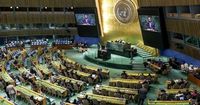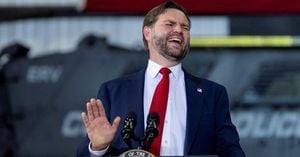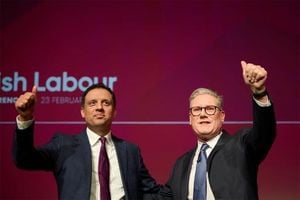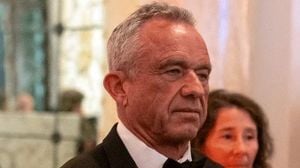On September 24, 2025, the United Nations General Assembly in New York witnessed a moment that few would have predicted just a year ago: Syrian President Ahmed al-Sharaa, once a notorious rebel leader, took the stage to address the world. It was the first time in nearly six decades that a Syrian head of state had spoken at the UN’s most important forum, marking Syria’s official return to international diplomacy after years of brutal civil war and global isolation.
Al-Sharaa’s appearance was more than symbolic. As reported by NPR and i24NEWS, he declared that Syria was entering a new chapter after almost sixty years under the Assad family’s repressive rule. “A land of ancient civilization and culture deserves to be a state of law protecting everyone, safeguarding rights, guaranteeing freedoms and fostering life to flourish while turning the page of a wretched past,” he said, speaking through an interpreter. The last time a Syrian president addressed the UN plenary was in 1967, when Nureddin al-Atassi represented a very different Syria.
The transformation of Ahmed al-Sharaa from a young jihadi fighter—once known as Abu Mohammed al-Jolani, a founder of an al-Qaida affiliate in Syria—into a statesman shaking hands with U.S. President Donald Trump and Ukrainian President Volodymyr Zelensky, is nothing short of remarkable. According to NPR, in December 2024, al-Sharaa led a coalition of rebels that ousted Bashar al-Assad, forcing the long-time autocrat into exile in Russia. "It was a military operation that was filled with mercy and good and prioritized tolerance and that did not target civilians," al-Sharaa stated, contrasting his actions with the Assad regime’s notorious use of chemical weapons and the mass displacement of millions of Syrians.
Al-Sharaa’s week at the UN was packed. On September 23, he met with President Trump on the sidelines of the General Assembly, their second meeting after talks in Riyadh earlier in the year. The following day, he sat down with Secretary of State Marco Rubio and then with President Zelensky. The result of the latter meeting was a joint communiqué restoring diplomatic relations between Ukraine and Syria, a move Zelensky welcomed as an “important step” and a sign of readiness to support Syria on its path to stability. “We agreed to build our relations on the basis of mutual respect and trust,” Zelensky wrote, as cited by i24NEWS.
In his address to the General Assembly, al-Sharaa outlined an ambitious agenda for Syria’s future. He described a government built on three pillars: balanced diplomacy, security stability, and economic development. “Syria has transformed from an exporter of crises into an opportunity for peace,” he proclaimed, as reported by The Spokesman-Review. He detailed the formation of a technocratic government, the launch of a national dialogue, and the creation of commissions for transitional justice and missing persons. He also emphasized the restructuring of civilian and military institutions to ensure all arms remain under state control—a nod to the chaos that has plagued Syria since the civil war began in 2011.
Yet, the road ahead is fraught with challenges. Al-Sharaa’s past as a jihadi fighter and his time with al-Qaeda and later the Islamic State have not been forgotten. Although he claims to have renounced extremism, doubts linger. As the Arab Reform Initiative noted, this was the first time a sitting head of state subject to UN sanctions had personally appeared at the organization’s main forum. Al-Sharaa is hoping the UN will follow the U.S. lead and lift long-standing sanctions against him and his government. The Trump administration, for its part, has suspended its sanctions and been actively mediating new security arrangements between Israel and Syria.
Israel remains a major sticking point. Since Assad’s overthrow, Israel has launched hundreds of airstrikes in Syria, targeting what it claims are threats to its security and efforts to protect the Druze minority in southern Syria. Al-Sharaa was blunt in his criticism: “And in this context, Israeli strikes and attacks against my country continue. And Israeli policies contradict the international supporting position for Syria, which threatens new crises and struggles in our region,” he said, as reported by NPR. Still, he affirmed Syria’s commitment to the 1974 disengagement agreement with Israel, pledging to use dialogue and diplomacy to overcome the crisis. “In response, Syria will use dialogue and diplomacy to overcome this crisis and pledge its commitment to the 1974 Disengagement Agreement,” he stated, according to i24NEWS.
Meanwhile, Syria’s domestic situation remains precarious. Despite the promise of inclusivity and national reconciliation, thousands have died in sectarian violence in recent months, and accusations of abuses by government security forces persist. Al-Sharaa addressed these concerns at the UN, promising transparency in investigating recent violent clashes in Sweida and Latakia and vowing, “I pledge to bring to justice all those whose hands were stained with the blood of innocents.”
Not everyone is convinced. Comfort Ero, president of the International Crisis Group, observed that many Syrians—especially minorities—remain wary of al-Sharaa’s jihadi origins and suspect his approach to governance is still exclusionary. “Syrians from across, I would say, the ideological spectrum, especially minority groups, they are wary of the president. They're wary of his jihadi origins. And they see his approach to governance thus so far as exclusionary,” Ero told NPR. She warned that the window for al-Sharaa to turn international goodwill into meaningful change is short, with both internal and external pressures mounting. Ero suggested the UN could help by moving its Syria-focused team from Geneva to Damascus to advise al-Sharaa on building the inclusive Syria he promised on the world stage.
Internationally, the mood is cautiously optimistic. Observers, including the Washington Institute, see al-Sharaa’s appearance as Syria’s official reentry into the international community, but they also note the risks of a return to authoritarianism if the new government fails to include minorities and deliver real reforms. The formation of a technocratic government, the push for economic development, and efforts to restore diplomatic relations—such as the new partnership with Ukraine—are all seen as positive steps, but they will be measured against the realities on the ground in Syria.
As Syria attempts to move beyond its bloody past, the world will be watching to see whether Ahmed al-Sharaa can truly deliver on his promises of peace, stability, and inclusivity—or if this new chapter will fall back into the old patterns of exclusion and violence. The stakes, for Syrians and for the region, could hardly be higher.





